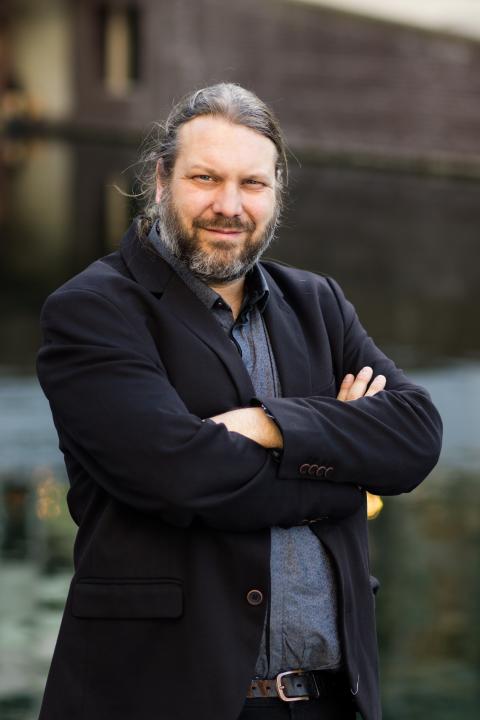Sander Bax on blended learning: “Leave educational innovation to lecturers”
The COVID-19 pandemic gave blended learning – a mix of face-to-face, on-campus classes and digital resources – wings, and Tilburg University’s strategy is giving this educational innovation yet another boost. For that innovation to be really successful though, lecturers should be in control, Sander Bax says. He was the driving force behind this strategic theme.
It is common knowledge that during the COVID-19 pandemic, blended learning became one of Tilburg University’s strategic priorities. The virus that forced us to keep our distance had a flywheel effect on digital tools in education. Looking back, Sander Bax, Vice-Dean at the Tilburg School of Humanities and Digital Sciences, vividly remembers a particular meeting of the School Council. It took place on the same day that the first patient in the Netherlands was diagnosed with COVID-19. “We were discussing an educational innovation plan and weren’t making any real progress. For example, students wanted videos, lecturers were against it.” In mere months, these difficulties had melted as snow before the sun. “At a School session in June 2020 a number of lecturers shared how they had been using blended learning in actual practice. We were deeply impressed, and I remember thinking: it’s these initiative that must be the basis of our educational innovation.”
TUNED IN
Two years later, and because of his involvement in this topic, Sander Bax was given the task of driving blended learning at Tilburg University and he was asked to set up an advisory committee. “When in 2022 we could open our doors again after the corona crisis, we were clear about one thing: let’s hang on to what’s good.” It was in that spirit that the advisory committee subsequently wrote the Blended Learning Program 2022-2027, and one of its recommendations was to set up the Tilburg University Network of Educational Development and Innovation: TUNED IN. The committee envisioned a close-knit network of colleagues who share expertise in and enthusiasm for blended learning. For educational innovation to succeed, Bax believes, it is essential that it happens close to lecturers. “Blended learning is about how colleagues shape education. That obviously has a deep impact on how lecturers do their work and that makes it imperative to involve them. Colleagues prefer to work with people who are experts and whom they know and trust. This informed our proposal to set up teams of colleagues at each School that explore blended learning and to enable these School teams to work together in one joint network.” Originally styled the Collaborate TUNED IN team by Bax and his committee, it now goes by the name of Teaching & Learning Center. “At this joint level, teams can share what they know.” Bax expects this network collaboration to engender a culture of renewal. “Colleagues empower each other with successful examples.”

What we don’t want is a small group of people coming up with ideas at their desks and then throwing them over the wall. That’s a nail in the coffin of educational innovation
Professor Sander Bax
Sluggish process
Teams close to lecturers are not the only condition to make TUNED IN a success, Bax believes. He also thinks that lecturers should be enabled to develop the required skills and, crucially, should be given enough additional time to do so. And in line with the national program endorsed by universities, they, too, should be recognized and rewarded. Yet another condition for success is adequate practical support in using blended learning. It should, for example, be easier to obtain a license for a tool. Bax: “Anyone who’s looking to get a license for a nifty tool, often has to go through a sluggish process. Decision-making takes a long time, and we think such matters should be expedited. It would also help if expert colleagues shared tools with us that we don’t yet know and that are already available under license.” What should remain beyond question, Bax insists, is that lecturers choose the tools themselves. “If you can’t use a tool well, you won’t use it at all. I appreciate there’s a limit to what can be done, but let’s please deliberate and make choices within the network together. What we don’t want is a small group of people coming up with ideas at their desks and then throwing them over the wall. That’s a nail in the coffin of educational innovation.”
Sufficient time to develop
Bax is equally outspoken about the importance of evidence-based working as a condition for success. “As a university, we have a duty to verify whether innovations make good on their promises. That often remains to be seen. One example is personalized learning: it’s a hype, mainly at secondary schools, but it’s safe to say it doesn’t always work. Our own research suggests it may even be detrimental to the quality of education, especially when lecturers are not given enough time to develop.” Bax sees to it personally that new blended learning applications at Tilburg University are properly evaluated – through the Tilburg Center of the Learning Sciences, whose Managing Director he became on January 1. He has since shed his role as a driver of change, and he expects none is likely to be needed anymore. “Schools are now fully committed to investing in blended learning, and blended learning matters greatly to students. The flywheel won’t stop spinning.”
'Weaving Minds & Characters' Strategy Towards 2027
Stay up-to-date on all strategic developments and activities leading up to our 100th anniversary.
